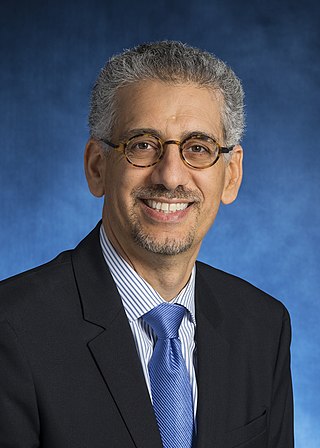Related Research Articles

The Johns Hopkins Bloomberg School of Public Health is the public health graduate school of Johns Hopkins University, a private research university in Baltimore, Maryland. As the second independent, degree-granting institution for research in epidemiology and training in public health, and the largest public health training facility in the United States.

Joseph L. Fleiss was an American professor of biostatistics at the Columbia University Mailman School of Public Health, where he also served as head of the Division of Biostatistics from 1975 to 1992. He is known for his work in mental health statistics, particularly assessing the reliability of diagnostic classifications, and the measures, models, and control of errors in categorization.
Alexander H. Leighton was a sociologist and psychiatrist of dual citizenship. He is best known for his work on the Stirling County (Canada) Study and his contributions to the field of psychiatric epidemiology. Leighton died at the age of 99 at his home in Digby, Nova Scotia.
Ronald C. Kessler is an American professor at Harvard Medical School. His research focuses on the precision treatment of mental illness to determine the appropriate intervention for specific patients. He ranks among the most highly cited researchers in the world, with an h-index of 340 as of June 2024.

Michael D. Knox, is an American educator, psychologist, author, and Anti-war activist, living in Dunedin, Florida. He is an Emeritus Distinguished University Professor in the Department of Mental Health Law and Policy; Affiliate Distinguished Professor, in the Department of Internal Medicine; and Affiliate Distinguished Professor Emeritus of Global Health at the University of South Florida (USF) in Tampa, Florida.
Lisa A. Cooper is an American internal medicine and public health physician who is the Bloomberg Distinguished Professor of Equity in Health and Healthcare at Johns Hopkins University, jointly appointed in the Johns Hopkins School of Medicine, Johns Hopkins School of Nursing and in the departments of Health, Behavior and Society, Health Policy and Management; Epidemiology; and International Health in the Johns Hopkins Bloomberg School of Public Health. She is the James F. Fries Professor of Medicine in the Division of General Internal Medicine, Director of the Johns Hopkins Center for Health Equity, and Director of the Johns Hopkins Urban Health Institute. Cooper is also a Gilman Scholar and a core faculty member in the Welch Center for Prevention, Epidemiology, and Clinical Research. She is internationally recognized for her research on the impact of race, ethnicity and gender on the patient-physician relationship and subsequent health disparities. She is a member of the President’s Council of Advisors on Science and Technology (PCAST). In 2007, she received a MacArthur Fellowship.
Peter Jerome Fagan is an American psychologist who served as director of the Sexual Behaviors Consultation Unit at Johns Hopkins University from 1985 to 2004.
Norman Sartorius is a German-Croatian psychiatrist and university professor. Sartorius is a former director of the World Health Organization's (WHO) Division of Mental Health, and a former president of the World Psychiatric Association and of the European Psychiatric Association. He has been described as "one of the most prominent and influential psychiatrists of his generation" and as a "living legend".
Thomas A. LaVeist is the dean and Weatherhead Presidential Chair at the School of Public Health and Tropical Medicine at Tulane University in New Orleans, Louisiana. He was previously the chairman of the Department of Health Policy and Management at the George Washington University, Milken Institute School of Public Health. He focuses mainly on the development of policy and interventions to address race disparities in the health field.
Abraham Morris Lilienfeld was an American epidemiologist and professor at the Johns Hopkins School of Hygiene and Public Health. He is known for his work in expanding epidemiology to focus on chronic diseases as well as infectious ones.
Daniel R. Weinberger is a professor of psychiatry, neurology and neuroscience at Johns Hopkins University and Director and CEO of the Lieber Institute for Brain Development, which opened in 2011.

Myrna Milgram Weissman is Diane Goldman Kemper Family Professor of Epidemiology in Psychiatry at the Vagelos College of Physicians and Surgeons and Mailman School of Public Health, Columbia University, and Chief of the Division of Translational Epidemiology at the New York State Psychiatric Institute. She is an epidemiologist known for her research on the prevalence of psychiatric disorders and psychiatric epidemiology, as it pertains to rates and risks of anxiety and mood disorders across generations. Among her many influential works are longitudinal studies of the impact of parental depression on their children.

Kathleen Ries Merikangas is the Chief of the Genetic Epidemiology Research Branch in the Intramural Research Program at the National Institute of Mental Health (NIMH) and an adjunct professor of epidemiology at the Johns Hopkins Bloomberg School of Public Health. She has published more than 300 papers, and is best known for her work in adolescent mental disorders.

C. Debra M. Furr-Holden was a Professor of Epidemiology at New York University’s School of Global Public Health. She served as the school's Dean from July 1, 2022, to March 29, 2024.
Michael John Klag is an American internist and epidemiologist. For eight years, he was the Director of the Division of General Internal Medicine and was the first Vice Dean for Clinical Investigation at the Johns Hopkins School of Medicine.

Josef Coresh is an American epidemiologist. He is the inaugural George W. Comstock Professor in the Department of Epidemiology at Johns Hopkins University. Coresh serves as the director of both the Cardiovascular Epidemiology Training Program and the George W. Comstock Center for Public Health Research and Prevention at the Johns Hopkins School of Medicine.
Felicia Hill-Briggs was an American behavioral and social scientist.
Ronald S. Brookmeyer is an American public health researcher. He is a professor of biostatistics at the UCLA Fielding School of Public Health.
Eliseo Guallar is an American epidemiologist. He is a professor of epidemiology at the Johns Hopkins Bloomberg School of Public Health with a joint appointment at the Johns Hopkins University School of Medicine. His research focuses on cardiovascular diseases.
Stephen Gange is an American statistician, epidemiologist, and academic administrator of Johns Hopkins University. He is a professor of epidemiology at the Johns Hopkins Bloomberg School of Public Health and has a joint appointment in the Johns Hopkins School of Medicine.
References
- ↑ Rosa M. Crum; James C. Anthony; Susan S. Bassett; Marshal F. Folstein (1993). "Population-Based Norms for the Mini-Mental State Examination by Age and Educational Level". JAMA: The Journal of the American Medical Association. 269 (18). JAMA Network: 2386–2391. doi:10.1001/jama.1993.03500180078038. PMID 8479064.